Hi there,
As Democracy Now! turns 29 this month, the need for independent news questioning and challenging those in power is more critical now than ever. Although this is a period of great uncertainty for news organizations like ours, we are unwavering in our commitment to continue to bring you fearless trustworthy reporting on the issues that matter most. If our journalism is important to you, please donate today in honor of our 29th anniversary. Every dollar makes a difference. Thank you so much.
Democracy Now!
Amy Goodman
Hi there,
As Democracy Now! turns 29 this month, the need for independent news questioning and challenging those in power is more critical now than ever. Although this is a period of great uncertainty for news organizations like ours, we are unwavering in our commitment to continue to bring you fearless trustworthy reporting on the issues that matter most. If our journalism is important to you, please donate today in honor of our 29th anniversary. Every dollar makes a difference. Thank you so much.
Democracy Now!
Amy Goodman
Non-commercial news needs your support.
We rely on contributions from you, our viewers and listeners to do our work. If you visit us daily or weekly or even just once a month, now is a great time to make your monthly contribution.
Please do your part today.
HeadlinesOctober 08, 2008
McCain, Obama Hold 2nd Presidential Debate
Senators Barack Obama and John McCain squared off in Nashville last night for their second debate of the presidential campaign. Although billed as a town-hall event, all audience questions were pre-approved.
Obama: Healthcare “A Right for Every American”
In one substantive moment, an audience member asked the candidates if they believe that healthcare should be a commodity sold by the for-profit insurance industry. Both Obama and McCain avoided answering the question directly. In a follow-up, moderator Tom Brokaw of NBC News asked if they believe healthcare is a right, a responsibility or a privilege. While McCain answered he sees it as a responsibility, Obama said healthcare is a right.
Sen. Barack Obama: “I think it should be a right for every American. In a country as wealthy as ours, for us to have people who are going bankrupt because they can’t pay their medical bills — for my mother to die of cancer at the age of fifty-three and have to spend the last months of her life in a hospital room arguing with insurance companies because they’re saying that this may be a preexisting condition and they don’t have to pay her treatment, there’s something fundamentally wrong about that.”
Obama has endorsed a mandate-style approach to healthcare, instead of the single-payer model favored by a majority of Americans.
McCain Claims New Proposal to Refinance Mortgages
On the economy, McCain unveiled what he called a new plan for the Treasury to buy up distressed mortgages to help struggling homeowners.
Sen. John McCain: “As president of the United States, Alan, I would order the secretary of the Treasury to immediately buy up the bad home loan mortgages in America and renegotiate at the new value of those homes
—- at the diminished value of those homes and let people make those -— be able to make those payments and stay in their homes. Is it expensive? Yes.”
The Obama campaign later said McCain’s plan is already in the bailout approved by Congress and that Obama has already proposed it. Obama said McCain’s credibility on addressing the economy is undermined by his endorsement of Bush administration tax cuts.
Sen. Obama: “Now, when Sen. McCain is proposing tax cuts that would give the average Fortune 500 CEO an additional $700,000 in tax cuts, that’s not sharing a burden. And so, part of the problem, I think, for a lot of people who are listening here tonight is they don’t feel as if they are sharing the burden with other folks.”
On energy policy, both candidates endorsed the use of nuclear power and coal. McCain took it a step further, dismissing Obama’s qualification that nuclear power should come with safeguards.
Sen. McCain: “What’s the best way of fixing it? Nuclear power. Senator Obama says that it has to be safe or disposable, or something like that. Look, I — I was on Navy ships that had nuclear power plants. Nuclear power is safe, and it’s clean, and it creates hundreds of thousands of jobs.”
McCain Calls Obama “That One”
The discussion of energy led to perhaps the night’s most talked-about moment, when McCain referred to Obama as “that one.”
Sen. McCain: “It was an energy bill on the floor of the Senate loaded down with goodies, billions for the oil companies, and it was sponsored by Bush and Cheney. You know who voted for it? You might never know. That one. You know who voted against it? Me.”
Fed Hints at Interest Rate Cut as Market Plunge Continues
Federal Reserve Chair Ben Bernanke is warning the economic crisis could take a turn for the worse, creating a threat he called of “historic dimension.” Bernanke made the call as he hinted at a possible cut in interest rates.
Federal Reserve Chair Ben Bernanke: “Overall, the combination of the incoming data and recent financial developments suggests that the outlook for economic growth has worsened and that the downside risks to growth have increased. At the same time, the outlook for inflation has improved somewhat, though it remains uncertain. In light of these developments, the Federal Reserve will need to consider whether the current stance of policy remains appropriate.”
Any rate cut would likely be coordinated with other central banks. Despite the possibility, global markets continue to decline. Here in the US, the Dow fell for a fifth consecutive day, losing five percent. Japanese markets fell more than nine percent today. Stocks also fell in Germany, Switzerland, France and Egypt. Iceland is said to be in such perilous shape the country is on verge of financial ruin.
Britain Launches $90B Bank Bailout
Meanwhile, Britain has announced a $90 billion bailout of some of its biggest banks. The move amounts to a part-nationalization of Britain’s banking sector. Spain says it’s also planning a similar bailout for its banks.
Market Decline Wipes Out $2T in Retirement Savings
Meanwhile, a congressional analysis says the stock market decline has led to the loss of about $2 trillion in Americans’ retirement savings over the past fifteen months. The erasing of retirement savings could force many workers to retire later and cut back on personal spending. The losses amount to about 20 percent of overall retirement savings.
Treasury to Begin Private Outsourcing of Wall Street Bailout
Meanwhile, the Treasury Department is set to begin outsourcing the Wall Street bailout as early as this week. The Washington Post reports the government will invoke special authority to hire contractors and consultants without following standard procedures. Department officials say some of the same firms involved in the financial collapse may wind up helping steer the government bailout of their industry. According to the watchdog group Taxpayers for Common Sense, a similar use of private firms during the savings and loans crisis of the late 1980s led to “untrammeled payouts to the private sector and reprimands from Congress and the Government Accountability Office.”
AIG Execs Held Luxury Vacation Days After $85B Taxpayer Bailout
On Capitol Hill, the House Oversight Committee continued hearings into the financial crisis with testimony from executives of the trouble mortgage giant AIG. Investigators revealed AIG executives held a week-long retreat at a luxury resort just days after receiving an $85 billion taxpayer bailout last month. The $440,000 vacation included $200,000 for rooms, $150,000 for meals and $23,000 in spa charges. Democratic Congress member Elijah Cummings of Maryland took issue with the timing of the retreat.
Rep. Elijah Cummings: “We contacted the resort where AIG held this week-long event, and we requested copies of AIG’s bills. We learned that AIG spent nearly half-a-million dollars in a single week at the — at this hotel. Now, this was right after the bailout.”
AIG has already used up $61 billion of its $85 billion government loan.
Judge Orders Release of 17 Gitmo Prisoners
A federal judge has ordered the release of seventeen Chinese Muslim prisoners at Guantanamo Bay. The ruling marks the first time an American court has ordered the release of a Guantanamo prisoner, rejecting the Bush administration’s vow it can hold them indefinitely. It’s also the first time a foreign national has been ordered transferred from Guantanamo to the US. The Uyghur prisoners would face possible torture and persecution if deported back to China. US District Judge Ricardo Urbina said the administration has failed to provide proof the prisoners were so-called enemy combatants or security risks. The prisoners will live with Uyghur families in Washington, D.C. until a permanent solution is found.
Study: US Lags in Compensation Payments to Afghan Victims
Yesterday marked the seventh anniversary of the US-led attack on Afghanistan. A new study says the US-led NATO occupation has killed up to 3,200 Afghan civilians since 2005. According to the Afghan Victim Memorial Project, a comparative tally shows the US is at the low end of compensation payments to Afghan victims up against other global cases.
After Denials, Pentagon Admits 30 Afghan Civilians Killed in US Attack
Meanwhile, the Pentagon is now backing off a nearly two-month-old denial of a mass killing of civilians in an Afghan village. Afghan officials, local residents and UN investigators say up to ninety civilians, including sixty children, were killed in the US attack on Azizabad on August 22nd. The Pentagon has repeatedly insisted the bombing only killed up to seven civilians and two dozen militants. But it now says thirty civilians were killed. A Pentagon investigator concluded many more civilians were buried in the rubble than the Pentagon had claimed. The reports of a ninety-person death toll have been backed by cell phone footage taken by local residents of scores of bodies, witness accounts and freshly dug grave sites.
Widow of Iraq Vet. Sues US Gov.
The widow of a young Iraq veteran who took his own life has sued the US government. Twenty-three-year-old Donald Woodward was in Veterans Administration care when he committed suicide. He had previously tried to kill himself on three previous occasions. Woodward’s wife, Tiera Woodward, says she’s launched the suit to improve mental health treatment for US veterans.
300 Workers Arrested in South Carolina Immigration Raid
Federal authorities have carried out another major immigration raid. On Tuesday, more than 300 suspected undocumented workers were arrested in a raid on a South Carolina chicken processing plant.
Md. Police Added Peace Activists to Terrorism List
In Maryland, new details have been released on the state police spying on peace groups and anti-death penalty activists. In July, Maryland was forced to admit its agents infiltrated meetings and events of the Baltimore Pledge of Resistance and the Baltimore Coalition Against the Death Penalty. On Tuesday, Maryland’s top police chief admitted fifty-three nonviolent activists, as well as several protest groups, were classified as terrorists and entered onto a federal database that tracks terrorism suspects. Activists are now being invited to review their files before they are deleted.
Bush Approval Rating at 25%
And President Bush’s job approval rating has dropped to the lowest point of his time in the White House. A Gallup poll put his job approval at 25 percent, just three points above the lowest-ever Gallup rating.
Most popular
- 1
- 2
- 3
- 4
Non-commercial news needs your support
Please do your part today.

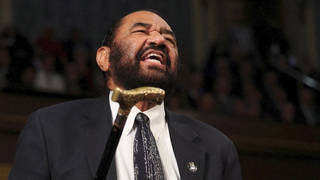
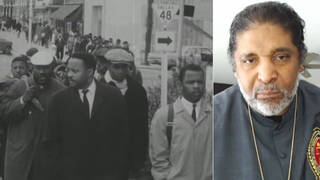
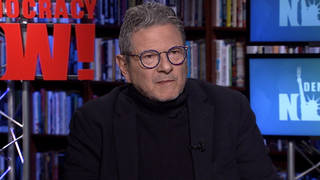
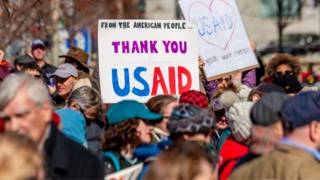





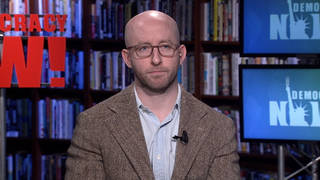
Media Options